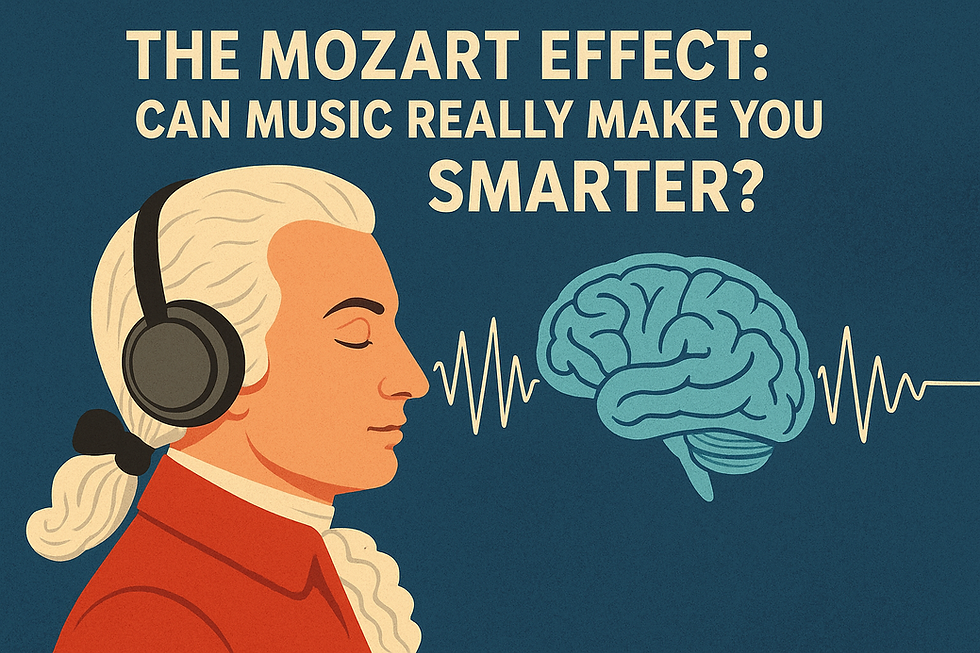"The Unsung Struggle: Facing Social Anxiety as a Music Learner"
- Sharanya naidu
- Jun 4
- 3 min read
Updated: Jun 16
We've all been there: the flutter in the stomach before a performance, clammy hands before an audition, or that sudden blank when you're asked to play something on the spot. If you're learning music, you've likely had a close encounter with social anxiety. But what if I told you that understanding this common feeling can actually improve your music learning performance?
It's true! Social anxiety isn't just an inconvenient hurdle; it's a fascinating area of psychology that, when understood, can empower you to become a more confident and effective musician.

What's the Deal with Social Anxiety Anyway?
At its core, social anxiety in music education is about the fear of negative evaluation. We worry about making mistakes, sounding bad, forgetting notes, or being judged by our teachers, peers, or audience. This fear triggers a physiological response – our "fight or flight" system kicks in. Our heart rate increases, palms sweat, muscles tense, and our focus narrows. While this can be helpful in a genuine threat, in a performance or learning setting, it can hinder our ability to play our best.
How Does Social Anxiety Affect Your Music Learning?
The impact can be multi-faceted:
Performance Paralysis: This is the most obvious. You might practice perfectly at home, but when it's time to play for others, your mind goes blank, your fingers fumble, and your musicality disappears.
Reduced Engagement in Lessons: You might hesitate to ask questions, offer ideas, or even volunteer to play, fearing you'll say or do something "wrong." This limits your opportunities for feedback and growth.
Avoidance Behaviors: Some learners might avoid performance opportunities altogether, or even stop taking lessons, to escape the discomfort of social situations related to music.
Impaired Focus and Memory: The stress response can make it harder to concentrate during practice, absorb new information, and recall learned material.
Negative Self-Talk: The cycle of anxiety often leads to self-criticism, which further erodes confidence and motivation.
Turning the Tide: Strategies for a Better Learning Experience
So, how can you navigate this challenging terrain and turn anxiety into an ally?
Acknowledge and Validate: The first step is to recognize that what you're feeling is real and normal. Many, many musicians experience social anxiety. Don't judge yourself for it.
Shift Your Focus from "Perfection" to "Process": Instead of striving for a flawless performance, focus on the joy of making music and the process of learning. Embrace mistakes as opportunities for growth.
Preparation is Key (But Don't Over-Prepare): Thorough practice builds confidence. Know your material inside and out. However, avoid obsessive over-preparation that can lead to burnout and even more anxiety.
Practice Performance Scenarios: Don't just practice in isolation. Play for family, friends, or even record yourself. The more you simulate performance conditions, the more comfortable you'll become.
Mindfulness and Breathing Techniques: Simple breathing exercises can calm your nervous system. Before a performance or lesson, take a few slow, deep breaths. Mindfulness can help you stay present and grounded.
Reframe Negative Thoughts: Challenge those inner critics. Instead of "I'm going to mess up," try "I've prepared for this, and I'm ready to learn and grow."
Focus on Connection, Not Judgment: Remember that most audiences want you to succeed. Connect with the music and with them, rather than focusing on their potential judgment.
Seek Supportive Environments: Surround yourself with teachers and peers who foster a positive and encouraging learning atmosphere.
Set Realistic Goals: Don't expect instant mastery. Celebrate small victories and acknowledge your progress.
Consider Professional Support: If social anxiety is significantly impacting your life and learning, don't hesitate to reach out to a therapist or counselor. They can provide valuable tools and strategies.
Your Musical Journey, Your Terms
Social anxiety can feel like a formidable opponent, but it doesn't have to dictate your musical journey. By understanding its mechanisms and implementing proactive strategies, you can transform it from a barrier into a stepping stone. Embrace the jitters as a sign that you care deeply about your music. And remember, every note you play, every challenge you overcome, makes you a stronger, more resilient, and ultimately, a more expressive musician.
Keep learning, keep playing, and let your music soar!



Comments